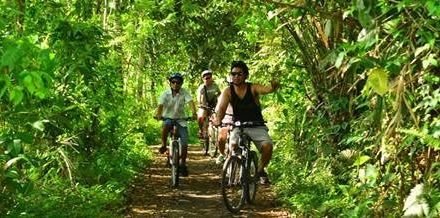Bali, the Island of Gods, is not just a feast for the eyes with its stunning landscapes, vibrant culture, and delicious cuisine. It’s also a sanctuary for a variety of wildlife. But as I’ve learned through my own adventures there, responsibly interacting with this wildlife is vital to their well-being and the health of the island’s ecosystems. In this article, I’ll share personal anecdotes, unique insights, and practical advice for engaging in ethical wildlife interactions in Bali.
Understanding the Landscape
When I first arrived in Bali, I was captivated by the lush greenery and the diverse animal life—from the cheeky monkeys in Ubud to the majestic sea turtles along the coastline. However, as I explored further, I quickly realized that not all wildlife interactions are created equal.
Personal Experience: The Monkey Forest
One of my first encounters was at the Sacred Monkey Forest in Ubud. I was enchanted by the playful macaques swinging through the trees; however, it didn’t take long for the reality of monetized wildlife interactions to set in. Some visitors were coercively feeding the monkeys snacks, often resulting in aggressive behaviors as the animals became reliant on human food. While it was tempting to snap a photo or encourage them to come closer, I took a step back, choosing to observe their natural behavior rather than influencing it.
Unique Insights: Respecting Boundaries
Bali is home to various wildlife conservation areas, and they often have clear guidelines in place. For example, at the Bali Sea Turtle Society, I learned about the importance of respecting nesting periods and avoiding disturbances. Witnessing a hatchling’s journey to the ocean was incredibly moving. The thrill of seeing a baby turtle make its first swim was magnified by the knowledge that I was witnessing a moment that had been preserved through conservation efforts.
It’s a great reminder that our presence should not disrupt the natural order. If you want to witness wildlife, always follow the local rules, keep your distance, and refrain from direct interaction.
Choosing Ethical Experiences
As travelers, we have the power to choose experiences that support animal welfare. Here are some options I found rewarding and ethical during my time in Bali:
Visit Ethical Sanctuaries
I had the chance to visit the Bali Elephant Sanctuary, unlike many establishments where elephants might be subjected to rides and tricks for entertainment. Here, the focus was on rehabilitation and ethical education. Watching the elephants roam freely and interact naturally among themselves was one of the most heartwarming experiences I’ve had. It was a gentle reminder of the deep connection we share with these magnificent creatures.
Engage with Local Guides
When I planned a snorkeling trip to Nusa Penida, I specifically chose a local guide who adheres to ethical practices. He emphasized not touching the coral or the marine life and educated us on how to coexist with the beautiful sea turtles and mantas we encountered. It was a more enriching experience, filled with moments of awe while remaining respectful of the ocean’s inhabitants.
Support Conservation Efforts
Consider volunteering or donating to organizations dedicated to wildlife preservation. I participated in a beach clean-up organized by an NGO on the island. The experience not only allowed me to contribute to protecting sea turtles and their habitats but also connected me with like-minded individuals who were passionate about making a difference.
Practical Tips for Ethical Wildlife Interactions
1. Research Before You Go: If you’re planning to visit a sanctuary, do a little bit of homework. Look for places that prioritize animal welfare and don’t exploit wildlife for entertainment.
2. Interaction Guidelines: Always adhere to interaction guidelines provided by establishments. Remember, your safety and the animal’s well-being should always come first.
3. No Feeding, No Touching: This may seem like common sense, but it’s critical. Feeding wild animals disturbs their natural foraging habits and may lead to aggression and health issues.
4. Capture with Care: If you’re taking photos, ensure you’re not imposing on the wildlife or their environment. Use a zoom lens to capture the moment from a distance, preserving their comfort and security.
5. Educate Yourself and Others: Share your experiences with friends and family and encourage them to prioritize ethical wildlife tourism. Your voice can help raise awareness and promote better practices.
Conclusion
Ethical wildlife interactions in Bali are both rewarding and crucial for the island’s ecosystems. By respecting boundaries, choosing ethical experiences, and educating ourselves and others, we become responsible travelers. Each experience deepens our appreciation for the natural world and reinforces our role in preserving it. So, the next time you find yourself in the breathtaking landscapes of Bali, pause and reflect on how you can interact with its wildlife ethically. After all, our shared planet is a treasure, and protecting it is a journey best taken together.






